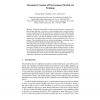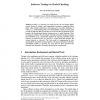126
click to vote
TACAS
2004
Springer
15 years 7 months ago
2004
Springer
Abstract. Failing model checking runs should be accompanied by appropriate error diagnosis information that allows the user to identify the cause of the problem. For branching time...
102
click to vote
TACAS
2004
Springer
15 years 7 months ago
2004
Springer
We present a method of deriving Craig interpolants from proofs in the quantifier-free theory of linear inequality and uninterpreted function symbols, and an interpolating theorem...
127
click to vote
TACAS
2004
Springer
15 years 7 months ago
2004
Springer
Abstract In the event that a system does not satisfy a specification, a model checker will typically automatically produce a counterexample trace that shows a particular instance ...
112
click to vote
TACAS
2004
Springer
15 years 7 months ago
2004
Springer
Abstract. Model checking suffers not only from the state-space explosion problem, but also from the environment modeling problem: how can one create an accurate enough model of the...
157
click to vote
SPIN
2004
Springer
15 years 7 months ago
2004
Springer
Most approaches for model checking software are based on ration of abstract models from source code, which may greatly reduce the search space, but may also introduce errors that a...
115
click to vote
RISE
2004
Springer
15 years 7 months ago
2004
Springer
In this paper, we develop a symbolic representation for timed concurrent constraint (tccp) programs, which can be used for defining a lightweight model–checking algorithm for re...
111
click to vote
PPDP
2004
Springer
15 years 7 months ago
2004
Springer
Object Petri nets (OPNs) provide a natural and modular method for modelling many real-world systems. We give a structure-preserving translation of OPNs to Prolog by encoding the O...
122
click to vote
ISCIS
2004
Springer
15 years 7 months ago
2004
Springer
Testing is a necessary, but costly process for user-centric quality control. Moreover, testing is not comprehensive enough to completely detect faults. Many formal methods have bee...
117
click to vote
IFM
2004
Springer
15 years 7 months ago
2004
Springer
Abstract. We present a framework for model checking concurrent software systems which incorporates both states and events. Contrary to other state/event approaches, our work also i...
127
click to vote
IFIP
2004
Springer
15 years 7 months ago
2004
Springer
Ensuring correctness of software by formal methods is a very relevant and widely studied problem. Automatic verification of software using model checkers from the state space exp...


